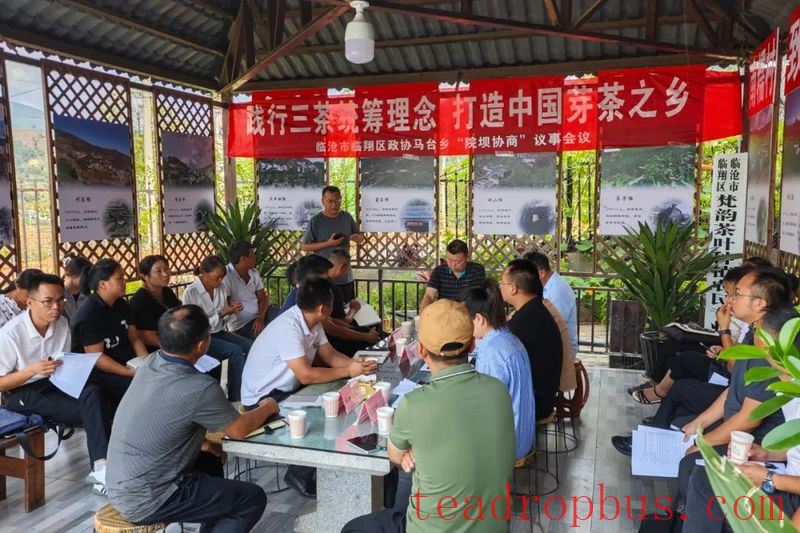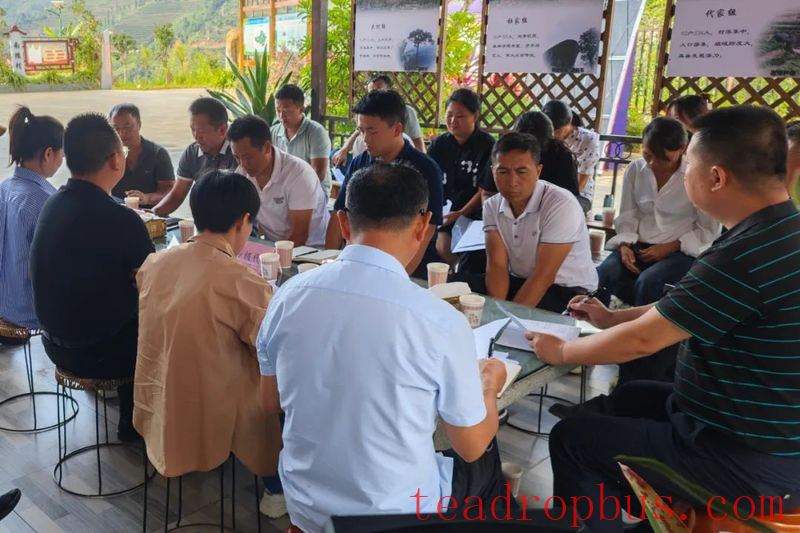On August 15, the District Committee of the Chinese People's Political Consultative Conference (CPPCC) convened a deliberative meeting in Nanruo Village, Maitai Township, themed “Practicing the Integrated Tea Concept to Build a Bud Tea Homeland.” Representatives from various sectors expressed their views freely, offering suggestions on ecological tea garden construction, brand building for bud tea, and technology-driven development for the Maitai bud tea industry.

Maitai Township is located along the Lancang River and was once an important stop on the ancient Tea Horse Road with a long history of tea cultivation. Tea is the dominant industry in the township and the main source of income for its residents. By the end of 2025, the total area under tea cultivation reached 56,000 mu, including 32,800 mu of bud tea, 15,000 mu of large tree tea, and a core area of 400 mu of rock tea. The region is known for its high-quality Yunnan large-leaf tea varieties, which serve as excellent raw materials for dianhong and Pu'er teas. Its specialty products, golden buds and golden needles, enjoy good market reception, with an average output value per mu exceeding 4,000 yuan. In recent years, the local government has been actively working to integrate Tea culture, tea industry, and tea science, promoting green development of the tea industry. Although some achievements have been made, there are still issues such as lack of brand impact, thin profit margins, inadequate ecological management of tea gardens, insufficient technological leadership, absence of unified standards throughout the process, and unstable tea quality.

During the meeting, representatives of the deliberative body, stakeholders, and township-level officials focused on the construction of ecological tea gardens in Maitai Township, emphasizing the importance of variety cultivation, brand building, and the promotion of tea culture. Through technological leadership and application for tea certifications, they aimed to elevate the market position of Maitai tea. They also planned to nurture leading enterprises, introduce scientific demonstration projects, strengthen live-stream marketing, and organize diverse tea-related events to comprehensively promote the high-quality development of the Maitai bud tea industry.
In response to the topic and the representatives' remarks, heads of relevant departments such as the District Publicity Department, the District Agriculture and Rural Affairs Bureau, the District Forestry and Grassland Bureau, the District Local Industry Service Center, the District Science and Technology Bureau, and the District Commerce Bureau provided opinions and suggestions based on their respective functions.

After thorough communication and consultation, a clear and targeted set of deliberative opinions was formed: continuous advancement of Green Tea garden base construction; focus on the cultivation of high-quality core tea varieties; active exploration of Maitai tea history, telling compelling tea culture stories, and enhancing the cultural profile of exemplary villages to increase the visibility and influence of Maitai tea; strengthening the role of technological leadership by engaging experts to analyze the comparative advantages of local bud tea from a scientific perspective, assisting in the creation of organic tea gardens, achieving certification of bud tea as a “National Famous, Special, Superior, and New” product and “Characteristically High-Quality Agricultural Product,” and cultivating one or two leading agricultural enterprises with good economic benefits, strong driving ability, and standardized management; striving for the implementation of a “Science Demonstration Village” project in Nanruo Village to drive the development of the entire township's bud tea industry; enhancing training for the tea live-streaming team in Nanruo Village to improve their ability to attract and utilize traffic, stimulating the internal driving force of live-stream sales, and continuously organizing various activities such as “tea competitions” to expand the influence of bud tea.
The meeting was chaired by Li Hongwu, Vice Chairman of the District CPPCC, with guidance provided by leaders and tea experts from the Municipal CPPCC and the Municipal Tea Research Institute.
Authors: Yi Simin and Zi Yimei